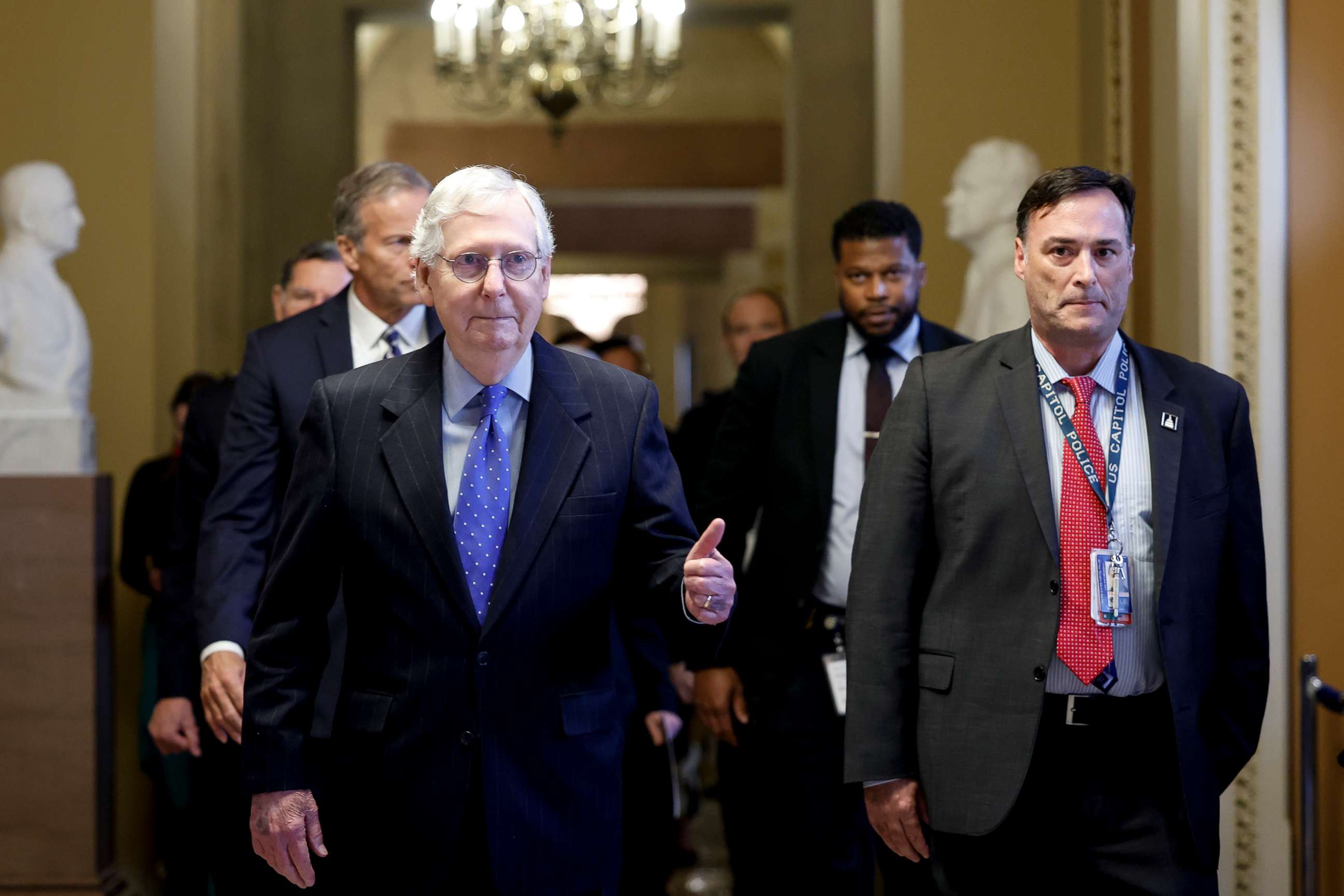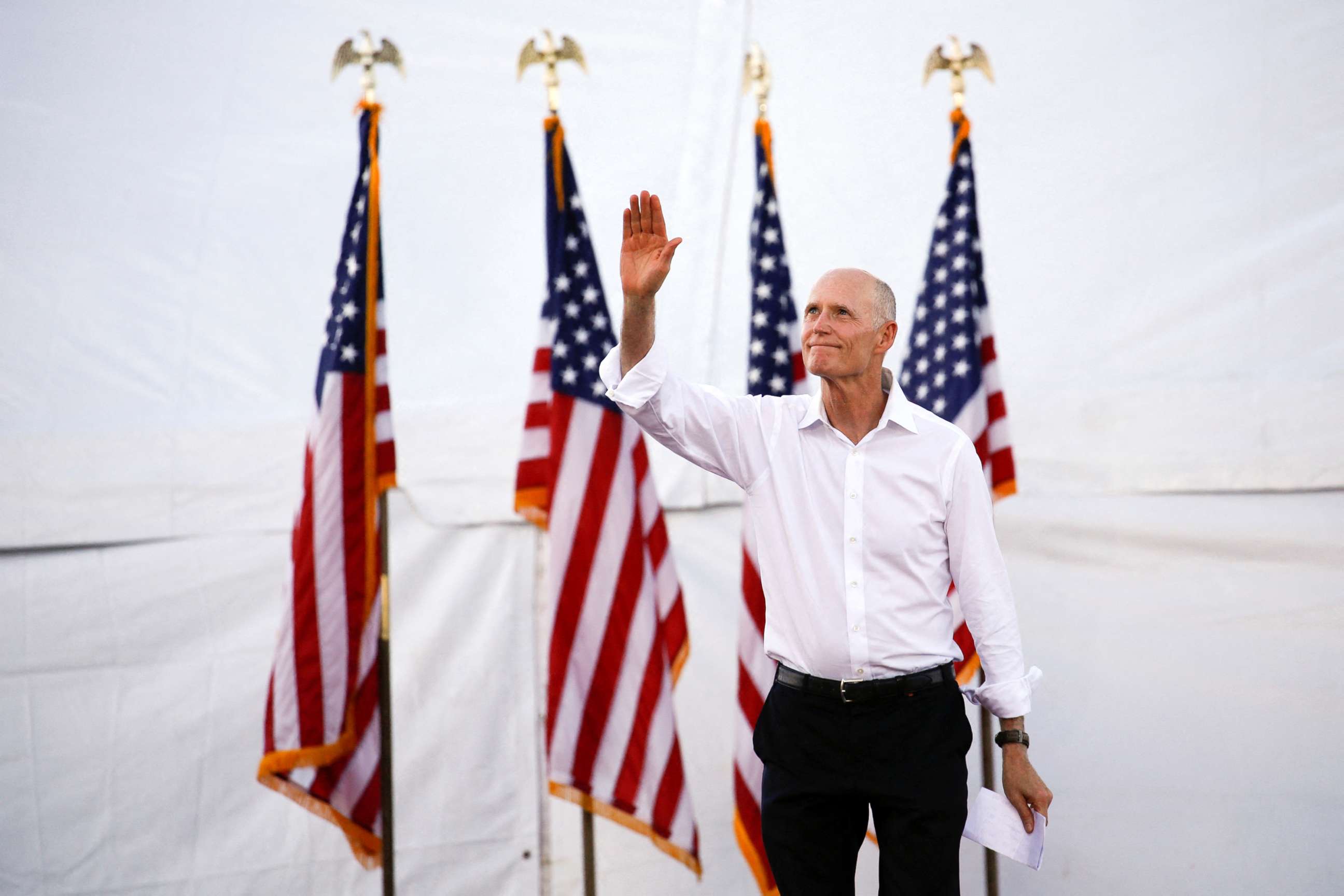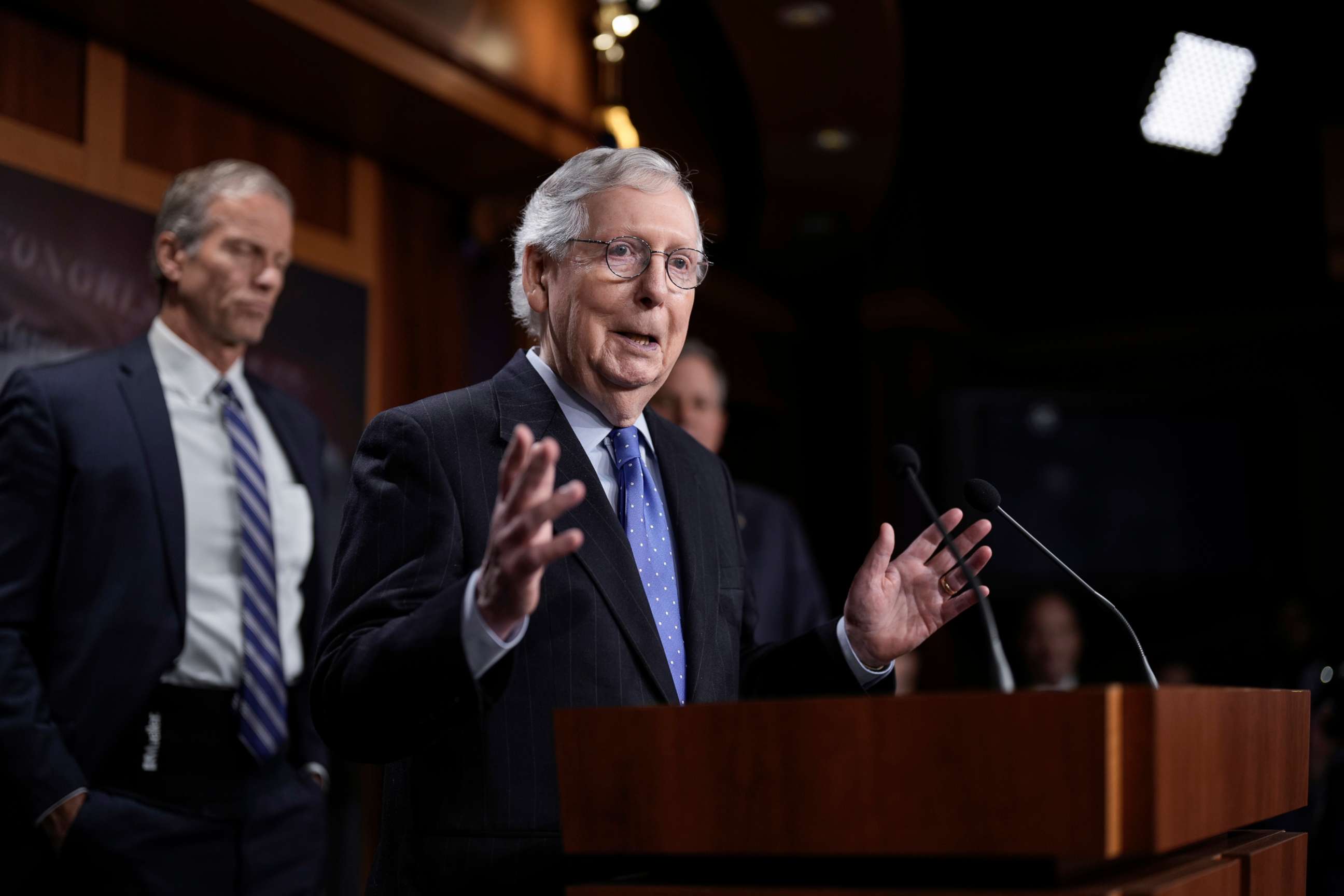McConnell reelected as Senate leader despite historic challenge from Scott
The vote, done by secret ballot behind closed doors, was 37-10 for McConnell.
Sen. Mitch McConnell on Wednesday was comfortably reelected as the GOP leader in the upper chamber despite a challenge -- his first in 15 years -- and despite intraparty finger-pointing over the GOP's disappointing performance in the midterms last week.
McConnell had faced opposition from Florida Sen. Rick Scott, who mounted a historic campaign for the post atop the Republican conference.
The leadership vote, done by secret ballot behind closed doors in the ornate Old Senate Chamber, was 37-10, with one member voting present, per Sen. Kevin Cramer, R-N.D.
The conference met for three and a half hours.
An effort led by Sen. Ted Cruz, R-Texas, to postpone Wednesday’s leadership vote also failed with supporters garnering 16 votes, per two GOP aides. He and his supporters pushed for the delay because they wanted the party to be squarely focused on the Dec. 6 Georgia runoff race, which could deliver one extra voting member to the conference if Republican candidate Herschel Walker is successful over Democratic incumbent Sen. Raphael Warnock.
“I just don't understand why we would say to Herschel Walker, 'Please, please, please, please, please, please go win the Senate seat,' but we are not interested in what you have to say, we don’t want you to have a voice in our elections,” said Sen. Josh Hawley, R-Mo., who supported the motion to delay the vote. “I just think that's wrong.”
Senate GOP aides, however, confirmed that Walker could have participated in Wednesday’s vote but he was busy campaigning back in his state.
In a news conference following the vote, McConnell said they had a "good discussion about what happened in the election and what happens in the next election."
"I think everybody in our conference agrees we want to give it our best shot to finish the job in Georgia and concentrate on that for the next month," McConnell said.
The stolid Kentuckian, who is currently on track to break former Sen. Mike Mansfield's record for longest-serving leader in history, had not previously faced any challenges to his role. The Scott move, recently pushed by former President Donald Trump, surprised many.
ABC News' Trish Turner pressed McConnell Wednesday on whether the challenge makes it more or less likely that he would consider stepping aside once he beats Mansfield's record in 2023.
"I'm not going anywhere," McConnell responded.

Scott, a McConnell critic of late -- who clashed with the leader over Republicans not putting forward a plan ahead of the midterms for how they would govern if they gained the majority -- exhorted his conference both in a private speech on Tuesday afternoon and in a letter to them to make a change from "the status quo."
"Like each of you, I am deeply disappointed by the results of the recent election. Despite what the armchair quarterbacks on TV will tell you, there is no one person responsible for our party's performance across the country," Scott, in charge of the GOP campaign arm this cycle in which the party performed far below expectations, wrote as he explained why he was the better choice over McConnell.
He added, "Unfortunately, we have continued to elect leadership who refuses to do that and elicits attacks on anyone that does. That is clearly not working and it's time for bold change. The voters are demanding it."
McConnell minced no words in talking to reporters on Tuesday, saying it was a matter of when -- not if -- he would be elected leader. Asked to respond to Scott's challenge, McConnell said: "I don't own this job."
Scott was replaced Wednesday by Montana Sen. Steve Daines in the role of NRSC chair.
But much of Senate Republicans' leadership team will remain unchanged after Wednesday's vote. Republican Minority Whip John Thune of South Dakota secured another two years in his role, and the Republican conference chair, Wyoming's John Barrasso, will remain in his job as well.
Republicans sound off on McConnell, Scott
The GOP conference had met for more than three hours Tuesday for what one senator called "a spirited discussion" and another said was "kind of a rhetorical slugfest."
"It was a really, really, good discussion. People have a desire to be a team and win, but we realize that we're 50 individuals. The new people (senators) were probably, like, 'Woah! What's going on?' But it was a healthy discussion," said Sen. Shelley Moore Capito, R-W.Va., a McConnell supporter elected vice chair of the conference by her colleagues on Wednesday.
About 15 to 20 senators stood to speak at the marathon meeting. Sen. Mike Braun, R-Ind., who spoke second, announced that he would be supporting Scott.
"When you measure how we've done in recent elections, especially the presidential ones, swing state Senate races, we got to do better," Braun, who joined the Senate with Scott in 2018, said. "It's very clear to me, I ran a business for 37 years, that if you don't have a master plan, a mission statement, which I don't think we have as a Republican Party, that it's not going to work. And I think independents elect the swing state senators and the president and that was on view here in these [midterm] elections."
"I think that when you keep having the same results, and presidential elections, we've won one popular vote since, what, 2004? It ought to cause you to have some deep thought about what you need to do differently," continued Braun.
Republican senators said McConnell appeared surprised by Scott's challenge but offered a retort eventually, saying that being leader is not an easy thing.
"He counter-punched a time or two … in just the difficulty of the job, which is true. It's not like any side has a mandate," Braun told reporters.
According to Sen. Hawley, who said he planned to support Scott, McConnell also took jabs at Scott's performance in his current role.
"Sen. Scott disagrees with the approach that Mitch has taken in recent years, and he made that clear, and Senator McConnell criticized Senator Scott's management at the NRSC and I imagine we'll hear more about that tomorrow," Hawley said.

As head of the National Republican Senatorial Campaign Committee, Scott controlled the purse string of the GOP's campaign arm. Under his leadership, the NRSC rounded the home stretch of campaign season with relatively little cash on hand, opening Scott to severe criticism, including from McConnell, whose super PAC had to pick up the slack.
"If you're gonna assess blame for election losses, I don't know how you trade in the leader for the gentleman at the NRSC," Sen. Cramer told the Huffington Post.
Multiple GOP senators have pointed to the sheer fundraising prowess this cycle of McConnell and his aligned super PAC, the Senate Leadership Fund, as a top reason to keep him at the helm.
"I'm certainly supporting the current leadership team. Mitch raised an extraordinarily large amount of money, used it to help elect Republicans," said Sen. Mitt Romney, R-Utah.
McConnell's super PAC, according to AdImpact, raised "a total of $205M pooled across nine Senate races."
Iowa Sen. Joni Ernst, a member of leadership and McConnell supporter, had said she had no problem with Scott seeking to oust McConnell but that Scott failed to make a substantive case for why he should be chosen.
"I do think that elections are OK, and I think if people want to make challenges or throw their name in, I think that's fine," said Ernst. "But what they have to do is present a real plan on what they want to see for the future of our conference, and I didn't necessarily hear that coming from Rick Scott. He had a lot of things that he wanted to air out his grievances about, but we haven't heard a conclusive plan yet."
But Scott actually did offer a plan for the party in advance of the midterms. In February, he put forward his "12 Point Plan to Rescue America." It made him no friends on either side of the aisle.
Congressional Democrats and the White House alike lambasted the Scott proposal, quickly turning it into a talking point. McConnell scorched Scott for suggesting that Republicans might raise income taxes.

"Let me tell you what would not be a part of our agenda," McConnell said in March, shortly after Scott announced his plan. "We will not have as part of our agenda a bill that raises taxes on half the American people and sunsets Social Security and Medicare within five years."
The public disagreement was the earliest sign that the relationship between McConnell and Scott was beginning to fracture. Trump, who has made his disdain for McConnell public, even nudged Scott to challenge McConnell for his seat, adding salt to the wound.
But while several Trump-aligned senators were expected to support Scott's bid during the closed-door vote on Wednesday, it was already clear that most Senate Republicans were prepared to keep McConnell.
Asked on Tuesday whether he thought Scott had any chance, Sen. Thom Tillis, R-N.C., was blunt: "Not at all. Not at all."




